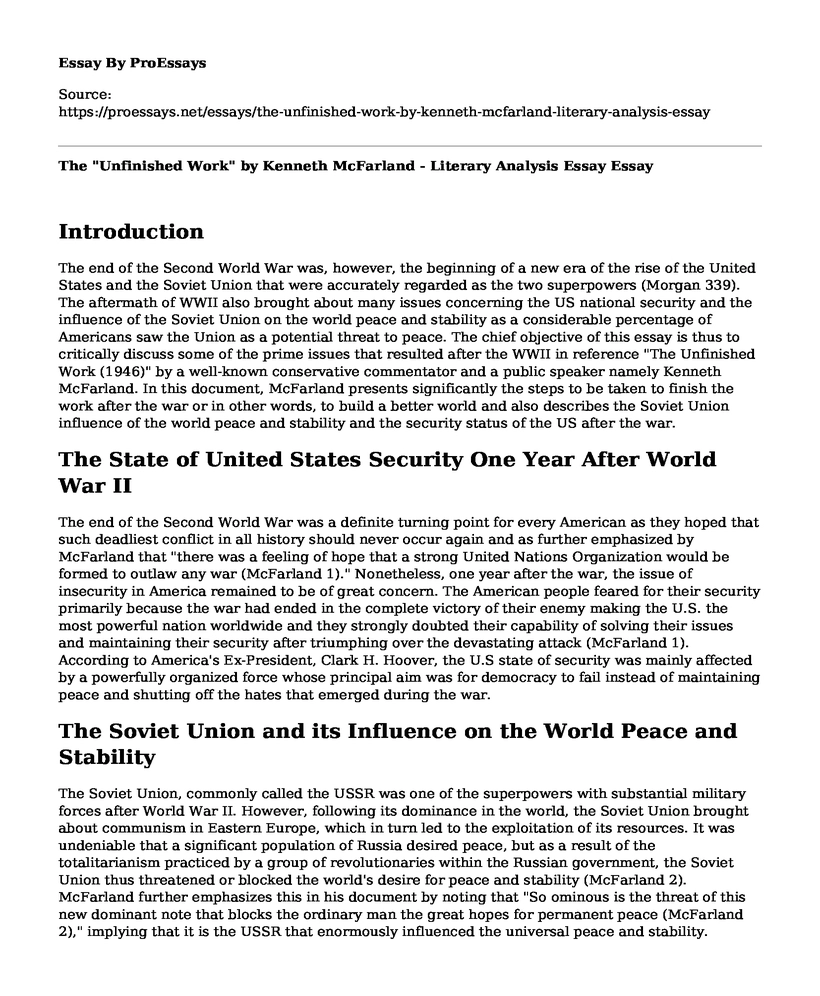Introduction
The end of the Second World War was, however, the beginning of a new era of the rise of the United States and the Soviet Union that were accurately regarded as the two superpowers (Morgan 339). The aftermath of WWII also brought about many issues concerning the US national security and the influence of the Soviet Union on the world peace and stability as a considerable percentage of Americans saw the Union as a potential threat to peace. The chief objective of this essay is thus to critically discuss some of the prime issues that resulted after the WWII in reference "The Unfinished Work (1946)" by a well-known conservative commentator and a public speaker namely Kenneth McFarland. In this document, McFarland presents significantly the steps to be taken to finish the work after the war or in other words, to build a better world and also describes the Soviet Union influence of the world peace and stability and the security status of the US after the war.
The State of United States Security One Year After World War II
The end of the Second World War was a definite turning point for every American as they hoped that such deadliest conflict in all history should never occur again and as further emphasized by McFarland that "there was a feeling of hope that a strong United Nations Organization would be formed to outlaw any war (McFarland 1)." Nonetheless, one year after the war, the issue of insecurity in America remained to be of great concern. The American people feared for their security primarily because the war had ended in the complete victory of their enemy making the U.S. the most powerful nation worldwide and they strongly doubted their capability of solving their issues and maintaining their security after triumphing over the devastating attack (McFarland 1). According to America's Ex-President, Clark H. Hoover, the U.S state of security was mainly affected by a powerfully organized force whose principal aim was for democracy to fail instead of maintaining peace and shutting off the hates that emerged during the war.
The Soviet Union and its Influence on the World Peace and Stability
The Soviet Union, commonly called the USSR was one of the superpowers with substantial military forces after World War II. However, following its dominance in the world, the Soviet Union brought about communism in Eastern Europe, which in turn led to the exploitation of its resources. It was undeniable that a significant population of Russia desired peace, but as a result of the totalitarianism practiced by a group of revolutionaries within the Russian government, the Soviet Union thus threatened or blocked the world's desire for peace and stability (McFarland 2). McFarland further emphasizes this in his document by noting that "So ominous is the threat of this new dominant note that blocks the ordinary man the great hopes for permanent peace (McFarland 2)," implying that it is the USSR that enormously influenced the universal peace and stability.
Steps That Must Be Taken to “Finish the Work”
According to McFarland, four significant measures must be undertaken by the living citizens to enhance a better world after the turmoil caused by WWII. The first step is to ensure a working democracy that will help overcome the Russian society idea of communism that caused depressions and unemployment. Next is that the American political leaders should continue appreciating the best of the citizens rather than often appealing to their worst (McFarland 2). In so doing, the leaders can carry out their duties based on moral grounds and reduce issues with racism, greed and other class hatred. Thirdly, McFarland insists that the public must be determined to overthrow any form of dictatorship and lastly everyone must focus on efforts that would effectively help to outlaw war.
Conclusion
In Conclusion, World War II was characterized by devastating destruction including the great economic depression as well as important events that played a prominent role in shaping the current state of the contemporary society. All in all, to achieve all the goals associated to the "unfinished work" in the post-war era, all these steps outlined by McFarland must efficiently be taken into consideration to enjoy a rich and better universe.
Works Cited
McFarland, Kenneth. "The Unfinished Work (1946)." Peasoncustom.com. Accessed from http://wps.pearsoncustom.com/wps/media/objects/2428/2487068/documents/doc_d28d09.html 25 February 2019
Morgan, Jason. "Freedom Betrayed: Herbert Hoover's Secret History of the Second World War and Its Aftermath." (2016): 338-348.
Cite this page
The "Unfinished Work" by Kenneth McFarland - Literary Analysis Essay. (2022, Nov 17). Retrieved from https://proessays.net/essays/the-unfinished-work-by-kenneth-mcfarland-literary-analysis-essay
If you are the original author of this essay and no longer wish to have it published on the ProEssays website, please click below to request its removal:
- Essay Sample on Development of History Through Writings
- Essay Sample on Rochester and Western New York History
- Essay on Victory at Tarin Kwot: US Army & Anti-Taliban Forces Win Great Mission
- Essay Example: The Frontier, American Democracy and Turner's Thesis
- Essay Example on Hitler and Nazis: Racist Worldview and Anti-Semitism
- Love & Folly in Shakespeare's Twelfth Night - Essay Sample
- Essay Example on Comparing Dahl & Wells: The Landlady & A Dream of Armageddon







